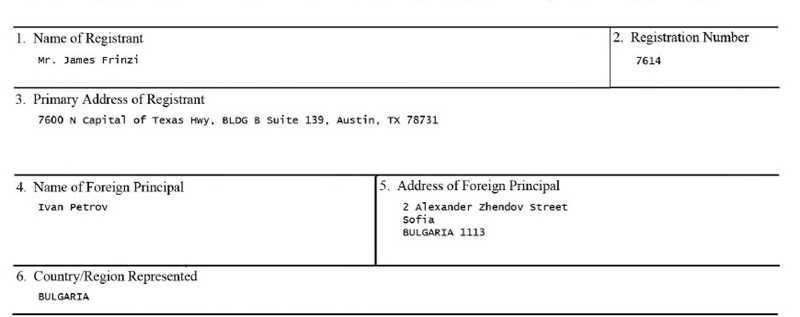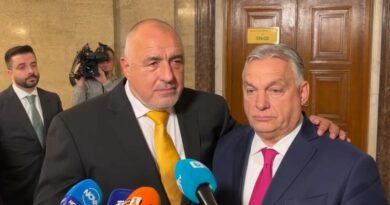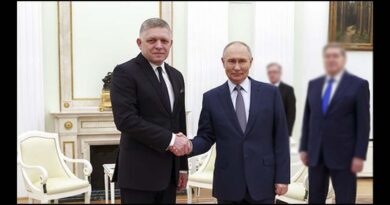Lobbying Scandal: Oligarch, Diplomat, and MFA in a Bold Scheme to Remove Peevski from Magnitsky List
A recent filing on the U.S. Department of Justice (DOJ) website has revealed an audacious attempt by a former Bulgarian diplomat to enlist a prominent U.S. lobbyist to secure the removal of oligarch Delyan Peevski from the “Magnitsky” sanctions list, implicating Peevski, a retired diplomat, and Bulgaria’s Ministry of Foreign Affairs (MFA).
The Players: A Lobbyist, a Diplomat, and an Oligarch
The filing, submitted by James Finzi—a veteran lobbyist known for representing authoritarian regimes from Qatar to Indonesia—names Ambassador Ivan Petrov as the principal, acting on behalf of the MFA, with its official address at 2 Alexander Zhendov Street, Sofia.
Ivan Petrov: A Convenient Figurehead
Ivan Petrov, Bulgaria’s former ambassador to Portugal, vanished from public view after retiring, only to resurface briefly in 2022 amid controversy. He was linked to the appointment of former State Security operatives as advisors to then-Foreign Minister Teodora Genchovska under Kiril Petkov’s government. Public backlash and the prime minister’s intervention quashed the appointments, and Petrov faded back into obscurity.
Now, Petrov is listed as the “principal” in a foreign lobbying contract—an arrangement that raises eyebrows. Sources within the MFA question how Petrov, reportedly lacking fluency in English and relevant expertise, could spearhead such a sensitive operation. His modest financial means further cast doubt on his ability to hire a high-profile U.S. lobbyist like Finzi. The use of the MFA’s address suggests institutional backing, pointing to Petrov as a loyal intermediary serving more powerful interests.
Support Independent Analysis
Help us keep delivering free, unbiased, and in-depth insights by supporting our work. Your donation ensures we stay independent, transparent, and accessible to all. Join us in preserving thoughtful analysis—donate today!
Public Funds for Private Gain?
Peevski’s efforts to be removed from the Magnitsky sanctions list began swiftly after their imposition. Initially, he engaged an American law firm experienced in representing sanctioned Russian oligarchs, such as Oleg Deripaska. Disappointed by lackluster results and high costs, Peevski pivoted to a more cost-effective strategy: leveraging state resources for personal benefit.
This approach echoes past tactics. Under previous administrations, lobbying efforts were funneled through Glavbolgarstroy (GBS), a construction company tied to ex-PM Borissov and Peevski’s influence. GBS opened a U.S. office and secured lucrative contracts from state gas transmission system operator Bulgartransgaz, potentially using the proceeds to fund lobbying activities and high-profile Washington events attended by figures from Boyko Borissov’s GERB party, Peevski’s DPS, and even the Prosecutor’s Office. These efforts provided a veneer of legitimacy but faltered under U.S. scrutiny of foreign lobbying transparency rules, prompting GBS to retreat back to the corporate field.
The Borissov–Peevski Alliance and the MFA’s Role
Under the current Borissov–Peevski coalition, the MFA could have been tasked with directly financing a renewed lobbying effort to remove Peevski from the Magnitsky list—an unprecedented and risky move. The now-public DOJ filing, submitted on Petrov’s behalf, is the culmination of this strategy.
Despite these efforts, U.S. authorities have remained adamant. During recent high-level meetings—one between Boyko Borissov and Donald Trump Jr. at Sofia’s Balkan Hotel and another between Foreign Minister Georg Georgiev and U.S. Secretary of State Marco Rubio at the NATO Foreign Ministers’ meeting in Brussels on April 3, 2025—U.S. officials reiterated that Peevski’s sanctions will stand. Georgiev, acting on Borissov’s orders, reportedly pitched business opportunities, including nuclear energy projects, TurkStream extensions, and military procurement deals, to sway U.S. officials. Rubio’s response was unequivocal that Peevski will stay on the list.
From Washington’s perspective, keeping Peevski sanctioned ensures his isolation and limits his influence.
Legal Risks and the Hungarian Precedent
Following the Brussels setback, the MFA may have authorized Petrov to engage Finzi through state channels. However, when the US media questioned the use of the MFA’s address in the lobbying registration, the ministry disavowed Petrov’s official capacity, raising suspicions of impropriety.
Two scenarios emerge: either Peevski or some of his business proxies are personally funding the operation while using the MFA’s address for credibility, or the MFA knowingly provided false information to U.S. authorities, exposing Petrov to potential criminal liability.
Peevski’s team appears to be emulating Hungary’s 2024 success in removing Viktor Orbán’s chief of staff, Antal Rogán, from the Magnitsky list by aligning with U.S. strategic interests. Peevski’s recent public appearances—posing in front of Bulgaria’s state coat of arms in his cabinet and projecting himself as a key state actor—aim to position him as indispensable to Western partners, despite his sanctioned status.
Rebranding as an Anti-Corruption Champion
To bolster his image, Peevski and Borissov are crafting a narrative of Peevski as a reformed anti-corruption crusader. This campaign, led by the anti-corruption commission (KPK) under Anton Slavchev—a figure closely aligned with Peevski—includes high-profile arrests of opposition PP-DB coalition mayors, framed as evidence of a renewed anti-corruption drive. The narrative suggests that Peevski’s US sanctions resulted from misinformation by political rivals, a claim that strains credulity given the U.S. government’s access to independent intelligence.
Tensions have surfaced with Prime Minister Zhelyazkov, who recognizes that overt support for Peevski’s KPK takeover and U.S. lobbying efforts risks Bulgaria’s international reputation.
A Desperate Power Play
At its core, Peevski’s strategy is to secure a senior state position, compelling Washington to reconsider his sanctions on geopolitical grounds. This ambition comes at a steep cost, undermining Bulgaria’s democratic institutions and political stability. By aligning closely with Borissov, Peevski is isolating GERB from former coalition partners, particularly PP-DB, while exacting revenge for past political setbacks.
Despite its audacity, the plan appears improvisational and unlikely to succeed. The true cost falls on Bulgaria’s democracy, rule of law, and global standing, as Peevski’s pursuit of power continues to erode public trust.
Ilian Vassilev




